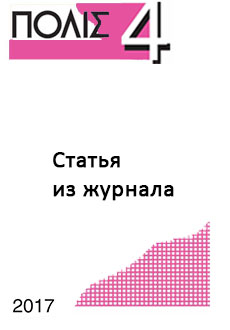Online shop of "Polis. Political Studies" Journal
We in the world, the world in us
Tzygankov A.P., Tzygankov P.A. Enlightened Statism (A.D. Bogaturov and Russian International Relations Theory). – Polis. Political Studies. 2017. No 4. P. 175-185 (In Russ.) .
Free!
A.D. Bogaturov; international relations theory; Russian school; Enlightened Statism.
The recently published collection of papers by Aleksei Demosfenovich Bogaturov is an excellent opportunity to reflect on his contribution to the theory of international relations and its future in Russia. Bogaturov introduced, polished, and popularized a number of important ideas and concepts such as the “paradigm of adjustment,” the “pluralistic unipolarity,” the “enclave-conglomerate” structure of the world, the “strategy of grindering “ of in world politics, and others. Russian IR scholars know and exploit these concepts in theoretical and applied research. There have been three influential traditions or ways thinking about the world in Russian science of international relations. Their representative value experiences of the West (Westernizers), independent statehood (Statists), and distinct system of cultural values (Third Rome), respectively. Each tradition of school of thought possesses its own images of Russia and international system that, historical changes notwithstanding, has preserved its internal coherence, continuity, and difference from other schools. Unlike Western realists, who assumed the centrality of the West in the international system, Russian enlightened statists take Russia’s internal development seriously. They seek to combine the ideals of strong, independent state with those of human rights learning from others. In the post-Soviet period of Russian international relations theory (RIRT) the school of Enlightened Statism was best represented by the work of A. Bogaturov and his students. Following M. Khrustalev, Bogaturov sees the main tasks of RIRT in synthesizing theory and applied analysis of international relations. In terms of applied analysis, the main challenge for RIRT after the Soviet dissolution has been to understand the new system of international relations and Russia’s role in it. In this respect, it is important to study political, military, normative-institutional, as well as geo-economic dimensions of the problem. The important theoretical conclusion is the need to develop Russian school of international relations while preserving flexibility and active dialogue with the West. Russia’s academic experience teaches us to not be limited to schools and paradigms, but instead develop approaches and concepts grounded in empirical realities. This is hard to follow model that should serve as an important goal in further RIRT development.
 English
English Русский
Русский

Reviews
There are no reviews yet.